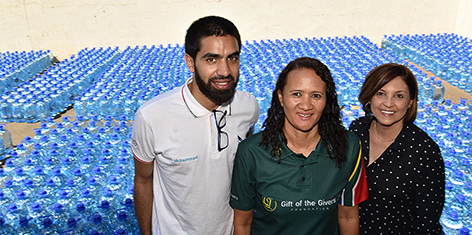
The Muslim Students Association (MSA), along with the Gift of the Givers Foundation, collected 3 500 5l bottles of water that was distributed to disadvantaged areas within the Free State. From left is Muhammed Bhamjee, President of MSA, Emily Thomas, project manager for Gift of the Givers Foundation, and Grace Jansen, one of the generous donors. Photo: Charl Devenish.
The Muslim Student Association (MSA) at the University of the Free State (UFS) took it upon themselves to respond to the regional water crisis being experienced in the Free State. Under the leadership of Muhammed Bhamjee, President of MSA, the association started an initiative to collect water for the purpose of distributing it to disadvantaged areas within the Free State.
The drive started out as just a humble request within the student community, but it gained a great deal of attention from staff, departments, and students from the UFS. The response was overwhelming; 3 500 5l bottles of water were donated.
Amongst the donors were the Student Affairs department and Grace Jansen, wife of Prof Jonathan Jansen, Vice-Chancellor and Rector of the UFS. Mrs Jansen said it was important for her to make a contribution: “Even though we are receiving, we need to give as well. Wherever there is a need, we need to be involved.” She believes the project has the ability to grow and gain more attention and support. She believes it needs to grow across communities to solve such problems together.
Bhamjee explains that the MSA has had a relationship with Gift of the Givers Foundation, as they have been running the campaign for quite some time. “We just felt that it’s our responsibility to get involved. Even with the little we can do, every bit counts at the end of the day.” He added that there is also a need to support fellow students at the UFS Qwaqwa Campus.
Emily Thomas, project manager for Gift of the Givers Foundation, applauds the MSA initiative, and encourages students to continue collaborating with the foundation to assist with disaster situations.